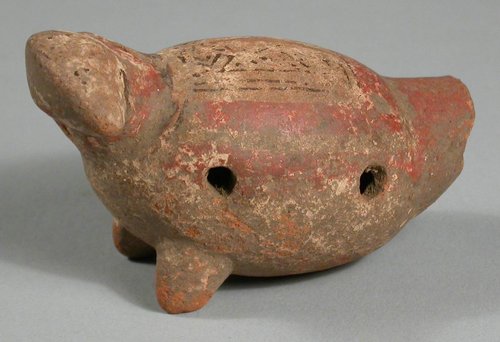Kleine, zoomorphe Gefäßflöte mit aufgeblähtem Resonanzkörper und zwei Füßen. Das Instrument besitzt vier Grifflöcher und ein kurzes, konisches Mundstück. Das Objekt wurde geglättet, geschlämmt, grundiert, bemalt und leicht poliert. Grundierung und Bemalung sind partiell erodiert.
Die Keramik besitzt eine weiß-bräunliche Grundfarbe, die rot und schwarz-braun bemalt ist. Die Objektform erinnert an ein Säugetier. Auf seinem Rücken befinden sich mehrere Bildfelder, die mit schwarz-braunen, geometrischen Motiven verziert wurden. Sie scheinen die Strukturen von Textil oder Flechtwerk widerzugeben. Die bemalten Sektoren werden von breiten, roten Linien begrenzt. Das Mundstück ist rot bemalt. Nach Lothrop 1926: highland polychrome ware.
Kulturelle Bedeutung: die Keramik der Mora Gruppe wurde im Nordwesten von Costa Rica hergestellt und nach dem Zentralen Hochland und der Atlantikregion des Landes gehandelt. Sie verwendet gestalterische Elemente (sitzende anthropomorphe Figuren mit Kopfschmuck, Matten-Motiv, Kan-Kreuz), die auch aus der Maya-Keramik (Copador-Gruppe) des Clásico Tardío (900-600d.C.) bekannt sind. Die Variante ist mit den Gruppen Gillén Negro sobre café claro (1350-1000d.C.) und Palmira Policromo (1350-1000d.C.) verwandt.
(Künne 2004)
Sammler: Lehmann, Walter
en

